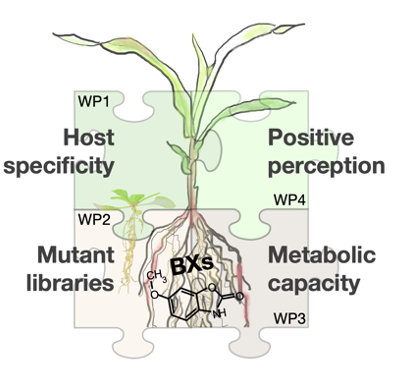Project members
Mikiko Karasawa, Anlun Wei, Jan Waechli, Dr. Christine Pestalozzi,
Abstract
Plant microbiomes, analogous to the gut microbiomes of humans, support their host with vital services such as promotion of growth, nutrition and health. Plants secrete a wide range of exudate compounds from their roots to the rhizosphere, thereby not only feeding the microbes but also shaping their communities. Benzoxazinoids (BXs)
are a group of bioactive secondary metabolites that are abundant in root exudates of cereals, including crops like maize and wheat. Exudation of BXs selectively structures the rhizosphere microbiota, which then causes growth and defence feedbacks on the next generation of plants. Such microbiota feedbacks affect the yields in crop rotations and an emerging vision is to harness the positive feedbacks for a more sustainable crop production. The overarching aim of mifeePs is to decode the microbial feedbacks on Plants. The project specifically asks whether positive feedbacks are linked to #1 host-specificity of the microbiome and/or to #2 plant tolerance to negative feedbacks. Both objectives ask in particular, if the root microbiome’s capacity to metabolize plant secondary metabolites causes host-specificity and/or explains tolerance. Objective #3 is to uncover this metabolic capacity of maize root bacteria, using mutant libraries (#4). The ultimate goal of mifeePs is to uncover the mechanisms of microbial feedbacks for better plant growth. This knowledge can then lead to crops that harness microbial feedbacks for better growth, allowing to optimize crop rotations and thereby securing productivity in a sustainable manner.
Publications
Quick Links
Social Media

